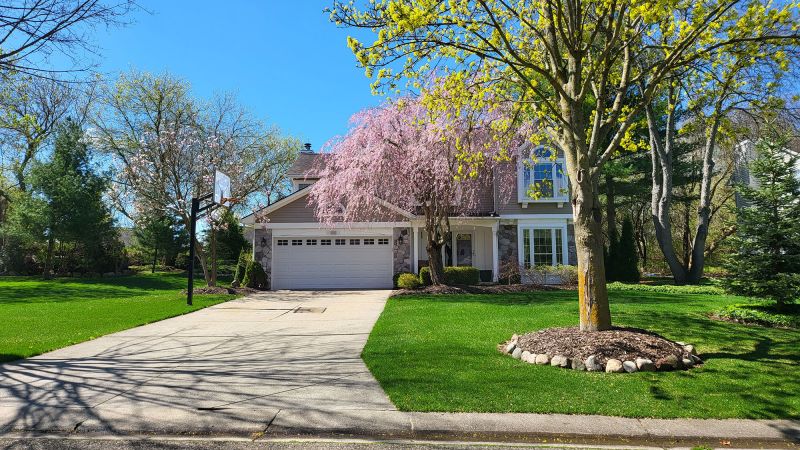When Jill Langen decided to list her Clarkston, Michigan, home of 25 years for sale last month, she did it without the help of a real estate agent. Seven days later, she had an agreement signed with a buyer and her home was off the market. Langen’s decision to go it alone isn’t typical among America’s home sellers.
Just 6% of home sales last year were for-sale-by-owner (FSBO), an all-time low, according to an annual report by the National Association of Realtors, the trade organization that represents over 1.5 million real estate professionals. However, some homebuyers and sellers may be looking for alternatives to the traditional real estate agent model after the standard commissions were challenged in a series of lawsuits in 2024 that led to changes in industry practices .

Langen, a 61-year-old higher education administrator, said the industry changes were “very much” on her mind when she decided to bypass a Realtor. Even after new rules for Realtors were enacted last year, most home sellers still pay a commission , averaging about 5% to 6% of their home’s sale price. Langen listed her home for $515,000; a sale at that price with the help of a traditional Realtor might have cost her between $25,750 and $30,900 in commission fees at closing.
For some, working with a Realtor may be worth it. Langen and other home sellers who tried the FSBO route said it takes a significant amount of time — and homework — to successfully sell your own home. And the typical FSBO property sold for $380,000 compared to $435,000 for agent-assisted home sales last year, according to data from NAR.
Real estate agents have pointed to this data as evidence that selling a home with a professional results in higher profits. “Our thought was: ‘We can try this for a few weeks and if it doesn’t work, we can always work with a Realtor. But let’s give it a shot,’” Langen said.
“FSBO is great for some people and probably not a good option for everybody. It was a really good option for us.” Here’s how Langen’s experience went.
Listing on your own Langen went into the home-selling process with some background knowledge: She and her husband worked with a Realtor to purchase a new home in the Denver area earlier this year before listing their Michigan home for sale. “For a year, we worked with a wonderful Realtor as buyers in Colorado,” she said. “We lived through that process, so we learned some things.
” Still, listing a home on your own can be a heavy lift. Langen prepared for the sale far in advance, taking photos of her home last spring when her yard’s foliage was in full bloom. She then looked at how much comparable homes in her area were selling for and settled on $515,000 as her list price.
Then she printed flyers and put a “For Sale” sign on her lawn. With the help of OpenAI’s artificial intelligence chatbot, ChatGPT, she crafted a description of her home and posted the listing on Zillow. Then came many, many calls.
Langen said she was fielding 20 calls a day, many from Realtors soliciting their services. “Some were wonderful and some were unpleasant, which surprised me,” she said. In the first few days, Langen hosted an open house and had multiple showings.
She and her husband spent hours beforehand cleaning their home and clearing out personal items, like dog toys from the living room and shampoo from the shower. “We wanted it to look welcoming, but not like someone was living there,” Langen said. Ultimately, Langen said she received multiple competing offers on her home and settled on an unrepresented buyer, meaning she was spared the commission fees for the seller’s agent and the buyer’s agent.
The good and the bad In a lot of ways, Langen’s story isn’t typical. Another friend who lived in her neighborhood had already sold their home via FSBO, which gave Langen the confidence that it could work. Her home was in a desirable neighborhood, with little inventory for sale, meaning buyer interest was already high.
“Time was on our side. We weren’t in a rush. We didn’t have to move before school started or a work deadline or something like that,” she said.
“We had some flexibility that made FSBO a good option for us.” Langen also had the time to take dozens of calls a day and put in the work. After finding her buyer, the home inspection followed.
After the inspection, Langen negotiated with the buyer of her home and agreed to pay for minor repairs to her home’s attic. “We just knew, because we just went through the process in Colorado, there would likely be something that had to be corrected. We worked through that with the buyer,” she said.
For closing , Langen used a title company that offered a package for FSBO homes. The title company generated all the necessary documents and helped Langen figure out how much money needed to go into escrow and how to deal with her homeowner’s association. She plans to schedule the closing for the end of the month.
“Closing is a little anti-climactic,” she said. “You just hand over the keys and the garage door opener.” Not all FSBO endeavors are successful, though.
Aditya Srinivasan, who recently retired and was planning a move with his wife to Eugene, Oregon, from California’s Bay Area, had a different experience. After listing his home on Zillow last month, Srinivasan, 70, said he was flooded with phone calls and text messages about his home. Many appeared to be from scammers; some were only willing to pay for the home in cryptocurrency.
Another would-be buyer strung Srinivasan along, only to drop her offer just before it was time to sign a purchase agreement. Ultimately, Srinivasan decided to pull his FSBO listing off the market. This month, he listed his home with a Realtor he trusts instead.
“You’ve got to be careful. Your bandwidth does get used up with these things a little bit,” he said. “When you’ve never done it before, there’s a learning curve.
”.















